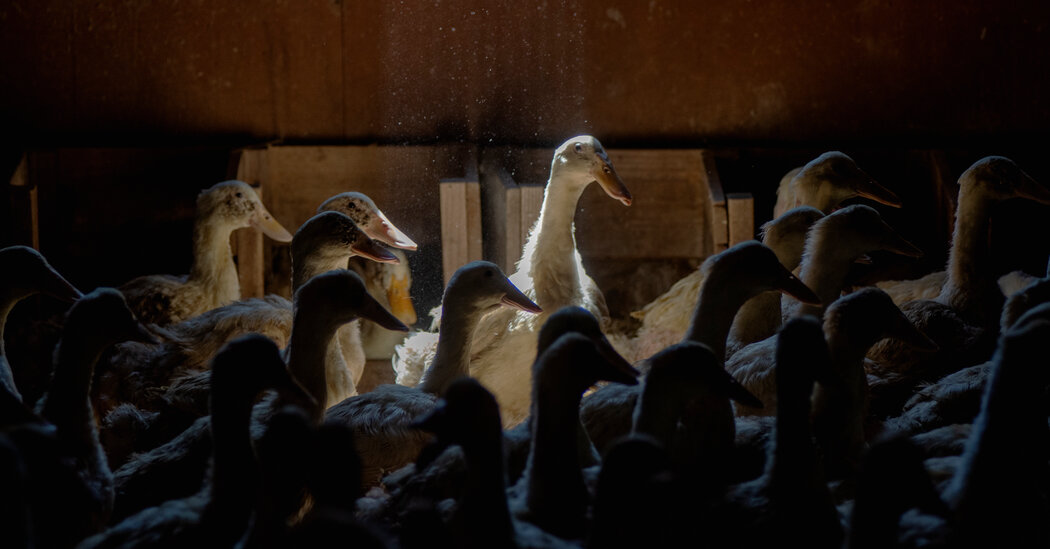Long Island duck is a delicacy savored across the country for its mild flavor and tender meat. But its future has been cast into doubt after the last duck farm on the island was quarantined for an outbreak of bird flu.
The farm, Crescent Duck Farm in Aquebogue, N.Y., must now kill its entire flock of almost 100,000 ducks and may go out of business, its owner said in an interview. The highly infectious virus, H5NI avian flu, was detected last week.
The Suffolk County Health Department said that the farm was under quarantine and that state and federal agriculture officials were on site to conduct “depopulating, cleaning and disinfection activities” at the facility, which supplies ducks to many restaurants in New York City and elsewhere. Similar outbreaks have led to the culling of herds and flocks in more than a dozen states.
Doug Corwin, who is part of the fourth generation of his family to operate Crescent Duck Farm, which has been open since 1908, said on Thursday that the future of his business was uncertain.
“I have done this all my life, and we are the last of this industry,” he said. “It is gut-wrenching. You work your whole life for something, and then one day everything is gone.”
Health officials said the risk to humans remained low. “The virus at this point is not transmissible among humans,” Dr. Gregson Pigott, the Suffolk County health commissioner, said in a statement.
But he said that transmission could be possible between infected birds and farm workers who had been exposed to them, and an investigation was underway.
There have been 67 confirmed human cases of H5N1 in the United States since last year and one confirmed death, according to the Centers for Disease Control and Prevention. The outbreak has caused growing concern across the country and led California to declare a state of emergency last month over outbreaks that affected hundreds of cattle herds.
Health officials did not publicly identify Mr. Corwin’s farm as the site of the outbreak, news of which was previously reported by RiverheadLocal, a Suffolk County news site.
Duck farming was once a pillar of the economy on Long Island, especially in the more rural eastern stretches of Suffolk.
In 1940, there were 90 duck farms in the towns of Brookhaven, Southampton and Riverhead, according to a historical study published by the Suffolk County Department of Planning. But today there is only Crescent.
The process of culling the birds, disinfecting the facility and lifting the quarantine on the farm could take two to three months, Mr. Corwin said.
He added that the one “glimmer of hope we have, that hopefully keeps us going,” is that the government agreed not to destroy several thousand eggs, which might enable him to revive his flock in the future.
But he had not decided whether to take that route.
“I am not 100 percent certain I want to go through that unless the U.S.D.A. approves a vaccine for this virus,” he said. “I don’t want to go through all of this again.”
A local hatchery has agreed to try to hatch the eggs, which may allow the farm to keep its genetic strain of delicious ducks, with an optimal meat-to-fat ratio, alive long enough to restart the business.
The farm produces 3.5 percent of all the ducks sold in the United States. It supplies restaurants in a number of cities, including New York, Washington, D.C., Philadelphia and Boston.
“The reason I am in still in business is my genetics, and if I can’t preserve my genetics, then I am worthless as far as duck farming goes,” Mr. Corwin said. “My customers are people who use multiple ducks a night — chefs who use duck after duck after duck.”
The outbreak has forced Mr. Corwin to lay off at least 45 of his roughly 75 employees. He said he was still shocked that his flock had become infected.
“This has spread like wildfire here,” said Mr. Corwin. “I am 66. My great-grandfather started this business. I have seen a lot of things in my years, but I haven’t seen anything like this.”





